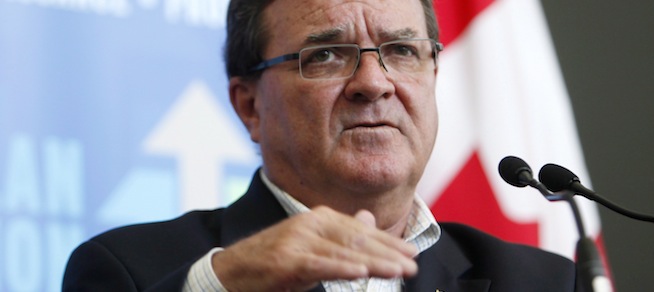Five stories we’re watching
The Maclean’s Ottawa bureau reviews the news with a nod to next week’s headlines
Finance Minister Jim Flaherty speaks at a news conference in in Ottawa Wednesday, August 15, 2012 in advance of his annual summer policy retreat. THE CANADIAN PRESS/Fred Chartrand
Share

The political workweek of Sept. 10-14 churned up five stories the endings of which have yet to be written.
1. Keep watching for Public Safety Minister Vic Toews to announce a federal appeal of the Quebec Superior Court’s Sept. 10 ruling that Ottawa must save the Quebec data in the scrapped federal long-gun registry, allowing the province to use it in its own planned database of rifles and shotguns. Toews promised to review the decision, and Conservatives will be shocked if he doesn’t opt to fight it in a higher court.
2. While news was focused on the 9/11 anniversary Tuesday, Finance Minister Jim Flaherty was in Newfoundland delivering a grim speech on the economy. At the St. John’s Board of Trade, Flaherty expressed growing concern about the outlook for the U.S. and emerging markets—and frustration over lack of private-sector job creation in Canada. Was this a preview of the government’s main economic message for the fall: we’re doing our part, but corporate Canada’s letting us down?
3. Stephen Harper won power in 2006 promising a new era of squeaky-clean political ethics. But his claim to having made good on that pledge has been undermined by the so-called robocalls scandal. On Sept. 12, a potential new opening for opposition attacks emerged, with word that actions of Harper’s chief of staff, Nigel Wright, are being examined by the federal ethics commissioner. Wright met repeatedly last spring with representatives of Barrick Gold Corp., even though he’s close to the Monk family, which owns the mining giant. Robocalls is complex. The PM’s top aide being lobbied by old, close friends isn’t. Making this a story worth monitoring for its impact on the government’s image.
4. The death on Sept. 13 of Peter Lougheed, the former Alberta premier who faced off against the Trudeau government’s National Energy Policy, prompted much reflection on former times. But Lougheed also had an influence on today’s Alberta politics. An old-school Progressive, he supported Alison Redford in her successful bid to fend off the Wildrose challenge in last spring’s provincial election. His passing, which prompted a flood of tributes, might lend luster to Redford’s brand of moderate, some even say “Red Tory,” Conservatism? It would be crass to politicize his death. Yet Lougheed’s iconic status could prove powerful as a beacon to those who stand against Alberta shifting ever rightward.
5. When the Parti Québécois won the Quebec election earlier this month, Ottawa politicos and pundits wondered how the Harper government would react to a separatist government. Nobody expected anything like this: on Sept. 14, Industry Minister Christian Paradis announced the end of the federal government’s controversial support for Quebec’s asbestos exports, blaming the Pauline Marois, the new PQ premier, for leaving Ottawa no choice. Is caving in on the first big file to be acted on since the election really the precedent the Tories had in mind? A tougher tone must be in store for the days and weeks ahead.